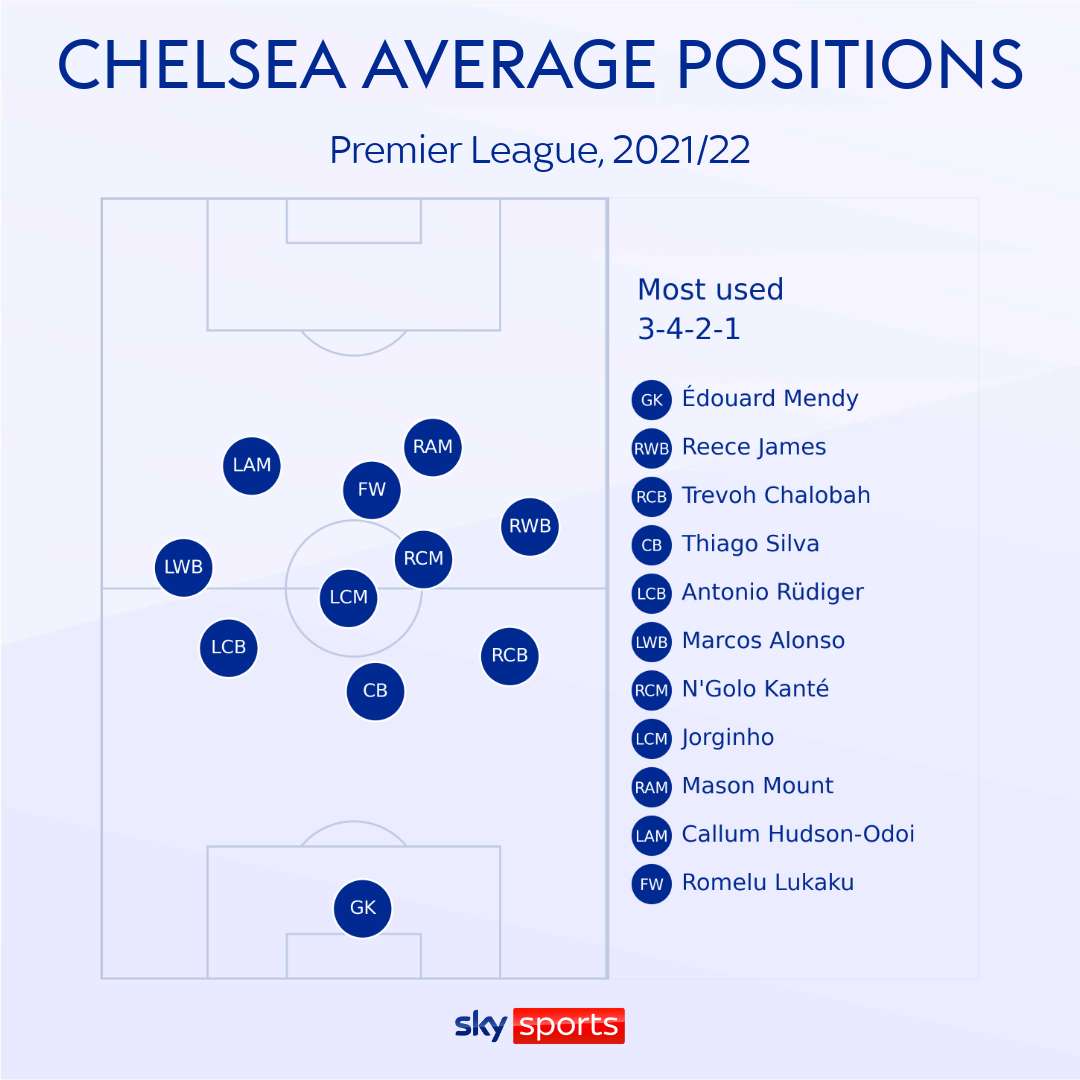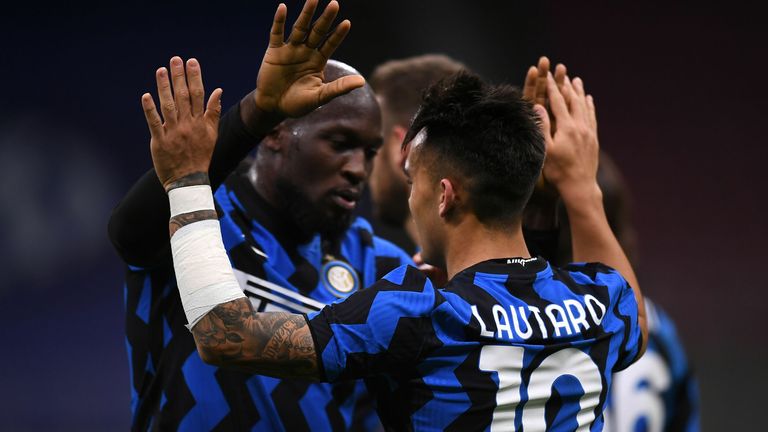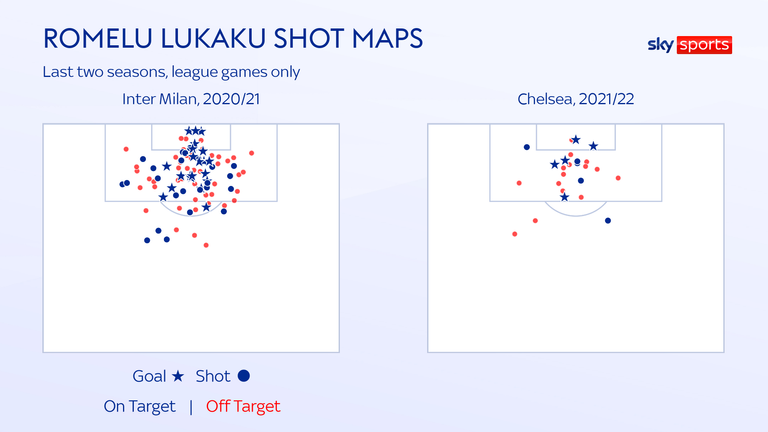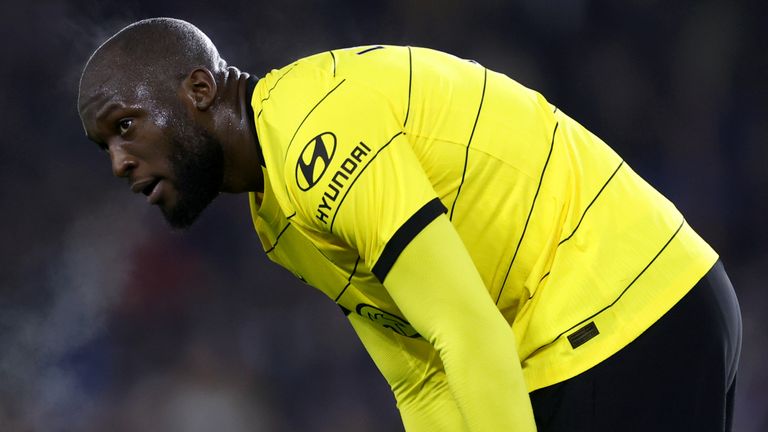Romelu Lukaku: Why is the Chelsea striker struggling to reproduce his best form for Thomas Tuchel’s side? | Football News
Romelu Lukaku could be seen remonstrating with Hakim Ziyech as Chelsea and Brighton’s players headed for the tunnel at half-time of Tuesday’s meeting at the Amex Stadium.
The visitors were in front courtesy of Ziyech’s long-range strike but it had been another frustrating evening for Lukaku, something he appeared to be making known to his team-mate.
The second half followed a familiar pattern, both for Lukaku, who was substituted late on having only touched the ball 18 times, and for Chelsea, who made it 13 points dropped from winning positions this season with the concession of Brighton’s equaliser.
Lukaku started the season strongly, scoring four goals in his first four appearances following his £97.5m move from Inter Milan in August, but an ankle injury in October hampered his progress and the intervening months have not been straightforward.
The Belgian aired his frustrations about Chelsea’s tactical approach in an interview with Sky in Italy, for which he apologised earlier this month, but he faces Tottenham on Sunday having only netted twice in his last 12 Premier League appearances. His form is under scrutiny and so is the way in which Thomas Tuchel is using him.
Lukaku’s changing role
Lukaku’s interview with Sky in Italy left him with work to do to repair relations with Chelsea’s supporters but it was interesting nonetheless to hear the striker speak so openly.
His comments on Chelsea dominated the headlines but there was plenty more on Inter. He said his spell there had “saved his career” after a difficult period at Manchester United. Manager Antonio Conte was described as a “massive influence”.
The success of his time in Italy, where he scored 64 goals in 95 appearances in all competitions and helped Inter win the Serie A title for the first time in over a decade, was down in large part to the way in which Conte configured his team.
It was geared to play to Lukaku’s strengths. Conte rarely deviated from a 3-5-2 formation and Lukaku formed a formidable strike partnership with Lautaro Martinez. “I could die on the pitch for him,” Lukaku told Sky in Italy of the Argentina international.
Tuchel’s preferred system is similar to Conte’s in the sense that it also consists of a back three, but there is a fundamental difference in attack, where Lukaku usually operates as a lone striker, flanked by two wide forwards, rather than in a front two.
This is problematic for Lukaku for several reasons.

Firstly, it means he is required to fulfil the duties of a target man, picking up possession with his back to goal in central areas, holding the ball up and feeding runners either side of him.
It is a role for which he appears physically well-suited but it is not one he relishes.
“The way I’m built – I’m quite big – everybody thinks I’m a sort of target man: just holding up the ball and being a goal poacher,” he said in an interview with UEFA published in October.
“But I’ve never played that way and I hate it. My biggest strength is that I’m dangerous when I’m facing towards the goal, because that’s when I rarely make wrong choices.”
Lukaku was able to play that way at Inter, facing towards goal rather than away from it, due in part to their attacking shape, which brings us to the second reason for his slower start to life at Chelsea.
The absence of wide forwards at Inter allowed Lukaku to spend more time in his favoured inside-right position, where he could collect the ball facing forwards and drive towards goal.
Many of the best performances of his career have come from that area. He has twice destroyed Arsenal from there, once with Everton in 2014 and again with Manchester United in 2018, and he did the same to Brazil with Belgium in the 2018 World Cup quarter-final.
At Chelsea, Tuchel’s preference for deploying two supporting forwards, one on each side, means Lukaku’s favoured zones are usually occupied, restricting his freedom and leaving him with fewer opportunities to pick up possession in deeper areas.
Instead, he is often isolated.
This season, as well as taking fewer shots and scoring fewer goals than he did at Inter, the 28-year-old is getting fewer touches of the ball, making fewer passes and creating fewer chances.
It is worth noting, too, that despite his reduced involvement, Lukaku is contesting considerably more aerial duels – his average of 6.2 per 90 minutes is up from 3.3 per 90 minutes at Inter last season – providing further evidence of how his role has changed to that of a target man.
Lack of service and chemistry
Lukaku is not free of blame for his struggles. There have been costly missed chances, including in last weekend’s 1-0 loss to Manchester City, after which his contribution was criticised by Tuchel.
“We had eight or nine offensive transitions, but zero touches in the box,” Tuchel told BT Sport. Lukaku, he added, had shown “a lack of positioning, timing and composure”.
“Of course we want to serve him,” Tuchel continued, “but he is part of the team, and the performance up front, we can do much better.
“Lukaku sometimes needs to do the service, he is included in this. He had many ball losses in very promising circumstances and he had a huge chance.”
Lukaku’s missed opportunity that day, when he chose to feed Ziyech early on instead of shooting himself, showed his confidence has suffered but the circumstances have not helped him.
Across the striker’s 17 starts, Tuchel has used 10 different combinations in Chelsea’s forward line. Lukaku has at times been deployed in a front two but even then, the identity of his partner has varied. It is a far cry from the consistency and stability he had alongside Martinez at Inter.
Tuchel’s rotation has been born out of necessity at times, of course, with Christian Pulisic, Kai Havertz, Ziyech, Mason Mount and Timo Werner all afflicted by injury at various points.
But the bigger issue is that none of those players has been able to perform at a consistently high level. Indeed, of Chelsea’s attackers this season, only Mount and Callum Hudson-Odoi rank inside the Premier League’s top 50 players in terms of chances created.
Reece James is also there, but with him and fellow wing-back Ben Chilwell now sidelined by long-term injuries, Chelsea’s creativity in general has deteriorated and so too has the service into Lukaku.
He averaged nearly four shots per 90 minutes across his first four Premier League appearances of the season. Since then, however, he has not had more than two efforts on goal in a single game.
There is a lack of chemistry as well as service.
Opta’s passing data shows Mount and midfielder Mateo Kovacic are the only players Lukaku is combining with regularly.
Remarkably, Hudson-Odoi, Werner and Ziyech have only found him with 12 passes between them in the Premier League so far this season.
The situation leaves Tuchel with plenty to ponder. The manager played down Lukaku’s struggles after the Brighton game – “Romelu is by far not the problem,” he said – but until he can find a way to play to his strengths, Chelsea may continue to stutter.
Watch Chelsea vs Spurs live on Sky Sports Premier League from 4.15pm on Sunday; kick-off 4.30pm





Pingback: ดูซีรี่ย์
Pingback: caluanie muelear oxidize for sale Uzbekistan
Pingback: 1xslot
Pingback: Ozempic vs Wegovy